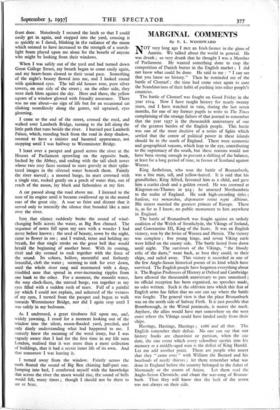MARGINAL COMMENTS
By E. L. WOODWARD
NOT very long ago I met an Irish farmer in the glens of Antrim. We talked about the world in general. He was drunk ; so very drunk that he thought I was a Member of Parliament. He wanted something done to stop the competition of Danish butter in the English market ; I did not know what could be done. He said to me : " I can see that you know no history." Then he reminded me of the battle of Clontarf ; the time had come once again to cure the Scandinavians of their habit of pushing into other people's countries.
The battle of Clontarf was fought on Good Friday in the year 1014. Now I have taught history for nearly twenty years, and I have watched in vain, during the last seven months, for one of my former pupils to write to The Times complaining of the strange failure of that journal to remember that the year 1937 is the thousandth anniversary of one of the greatest battles of the English people. This battle was one of the most decisive of a series of fights which settled that the centre of political power in these islands should be in the south of England. There were economic and geographical reasons, which leap to the eye, contributing to the supremacy of the south, but these reasons would not have been strong enough to prevent a shifting of the balance, at least for a long period of time, in favour of Scotland against Wessex.
King Aethelstan, who won the battle of Brunanburh, was a fine man, tall, and yellow-haired. It is said that his grandfather, King Alfred, favoured him as a child, and gave him a scarlet cloak and a golden sword. He was crowned at Kingston-on-Thames in 924 ; he annexed Northumbria to the realm of England. lie took high-sounding titles ; basileus, rex monarchus, dispensator totius regni His sisters married the greatest princes of Europe. There is, as far as I know, no public monument to him anywhere in England.
The battle of Brunanburh was fought against an unholy coalition of the Welsh of Strathclyde, the Vikings of Ireland, and Constantine III, King of the Scots. It was an English victory, won by the levies of Wessex and Mercia. The victory was complete ; five young kings, and seven Viking earls were killed on the enemy side. The battle lasted from dawn until, night. The survivors of the Vikings, " the bloody relic of the darts," went back, as best they could, to their ships, and sailed away. This victory is recorded in one of the few Anglo-Saxon historical poems of its kind which have survived. The English people have forgotten everything about it. The Regius Professors of History at Oxford and Cambridge have allowed the thousandth anniversary to pass unnoticed ; no official reception has been organised, no speeches made, no odes written. Such is the oblivion into which this feat of English arms has fallen that no one can 'say where• the battle was fought. • The general view is that the place Brunanburh was on the north side of Solway Firth. It is just possible that Bromborough, in the Wirral peninsula, is nearer the mark. Anyhow, the allies would have met somewhere on the west coast where the Vikings could haVe landed easily from their ships.
Hastings, Hastings, Hastings ; zo66 and all that. The English remember their defeat. No one can say that our history books are chauvinist or partisan, when the one date, the one event which every schoolboy carries into his memory as a middle-aged man is the defeat of King Harold. Let me add another point. There are people who assert that they " came over " with William the Bastard and his boatloads of needy thieves ; let them remember what wa! done in England before the country belonged to the dukes of Normandy or the counts of Anjou. Let them read the Anglo-Saxon Chronicle, and chant the war-song of Brunan- burh. Thus they will know that the luck of the arrow was not always on their side.










































 Previous page
Previous page